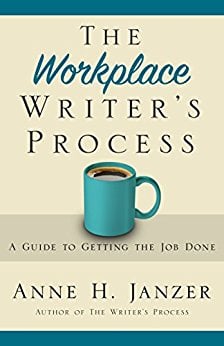
The Workplace Writer’s Process came in second place in the non-fiction category of the 2018 IndieReader Discovery Awards, where undiscovered talent meets people with the power to make a difference.
Following find an interview with author Anne Janzer.
What is the name of the book and when was it published?
The Workplace Writer’s Process: A Guide to Getting the Job Done, published July 2017
What’s the book’s first line?
What would happen to your career if you did more writing, creating content that consistently fulfills its objectives?
What’s the book about? Give us the “pitch”.
This book covers the business communication skills no one teaches you in writing class—the practices that elevate your career and make you more effective in your job. These include the unsung skills of empathizing with the reader and collaborating effectively with subject matter experts in the workplace.
What inspired you to write the book? A particular person? An event?
After spending a career writing for more than a hundred different companies, I wanted to share hard-won lessons about how to be effective (and efficient) when writing for organizations. It’s not enough to write well. You have to know how to navigate potential pitfalls and create content that people value.
What’s the most distinctive thing about the main character? Who-real or fictional-would you say the character reminds you of?
It’s a nonfiction work, of course, but you’ll see people you know and situations from your work life in the pages. Whether you think of yourself as a writer or not, most people in traditional jobs have to write, and we all face similar challenges.
What’s the main reason someone should really read this book?
Writing is a great way to increase your visibility and extend your reach, either in your organization or in the world at large. It’s like an accelerant for your career.
When did you first decide to become an author?
As a child, I dreamed of being an author. But I didn’t do anything about that dream until many years later, as an adult, when I decided to take a chance and try writing a book. I haven’t looked back.
Is this the first you’ve written?
The Workplace Writer’s Process is my third book. It’s a companion to my second book, The Writer’s Process, which is about the inner game of writing. And since publishing it, I’ve written and published a fourth book, Writing to Be Understood, about the craft and science of nonfiction.
What do you do for work when you’re not writing?
In addition to the work of being my own publisher (promoting the book, building the platform), I work with a few nonfiction authors to create customized marketing plans for their books.
How much time do you generally spend on your writing?
As a nonfiction author, my writing patterns and schedules are cyclical. I’ll spend months deep in research. In the drafting phase of the project, I’ll spend hours writing or revising each day. When it’s time to publish and promote, much of my time is spent writing blog posts and emails. No matter where I am in a book cycle, everyday set aside time for freewriting to clarify my thoughts and think deeply.
What’s the best and the hardest part of being an indie?
The good news for indie authors is this: you’re in complete control. The bad news? You’re in complete control. Seriously, I love having control of my book. The world of publishing is changing so quickly that it’s a constant learning exercise. As an indie author, I can adapt to changes and experiment easily. But there’s no one else to blame for your mistakes or keep track of things for you.
Would you go traditional if a publisher came calling? If so, why?
I am much less likely to consider a traditional publisher now than I was when I started, because I like having control over my work. But I would entertain working with a publisher for the right project. There are no “hard and fast” rules in publishing today.
Is there something in particular that motivates you?
My core motivation is helping people communicate with each other more effectively, because heaven knows the world needs it. My greatest satisfaction comes from hearing people tell me that my books have helped them as writers.
